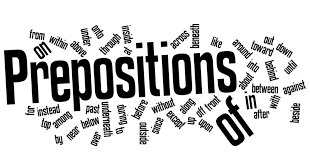Preposition - 2 | English Grammar Basic - Class 10 PDF Download
Relations Expressed by Prepositions
Prepositions are words used to express various relations between other words within a sentence. These relations can pertain to time, place, agency, manner, cause, possession, measure, contrast, and inference.
1. Time
Prepositions can indicate time, showing when something happens.
- After: Indicates something happening later in time. Example: After his death.
- At: Used for specific points of time. Example: At an early age.
- Before: Indicates something happening earlier in time. Example: Arrived before me.
- Behind: Indicates being late. Example: Behind time.
- By: Indicates a deadline. Example: By three o' clock.
- During: Indicates the entire duration of an action or event. Example: During the whole day.
- For: Indicates the length of time. Example: For many years.
- From: Indicates the starting point of time. Example: From January 1, 2001.
2. Place
Prepositions can indicate place, showing where something happens or is situated.
- About: Refers to movement around an area. For example, "The explorer travelled about the world."
- Across: Indicates movement from one side to another. For instance, "Ran across the road."
- Against: Signifies leaning or being in contact with something. Example: "He leaned against the wall."
- Among: Indicates being in the midst of a group. For example, "The dog ran among the trees."
- At: Denotes a specific point or location. Example: " At death's door."
- Athwart: Indicates something positioned across. For instance, " Athwart the deck."
- Before: Signifies being in front of something. Example: "Stood before the door."
- Behind: Indicates being at the back of something. For example, "Stood behind the curtain."
- Into: Denotes movement towards the inside. Example: "Fell into a ditch."
- Near: Indicates proximity. For instance, "Lies near the heart."
- On: Denotes position on a surface. Example: "Kolkata is on the Hooghly."
- Over: Indicates position higher than something. For example, "The cliff hangs over the sea."
- Round: Indicates movement around something. For instance, "Tour round the world."
- Through: Denotes movement within something. Example: "Marched through the town."
- To: Indicates direction towards a point. For instance, "He walked to the market."
- Towards: Indicates direction. Example: "Traveled towards Goa."
- Under: Denotes position below something. For example, "Lay under the table."
3. Agency, Instrumentality
Prepositions can indicate the manner in which an action is performed or the instrument used to carry it out.
- At: Used to specify the method of sale. For instance, "Sell goods at auction."
- By: Indicates the agent or means of an action. Examples: "Sent the parcel by post," "Was stunned by a blow," "Was destroyed by fire."
- Through: Signifies the medium or channel. Example: "Heard through a friend."
- With: Denotes the instrument used. Example: "Cut it with a knife."
4. Manner
Prepositions can indicate the manner in which something is done.
- By: Indicates a gradual process. Example: "Dying by inches."
- With: Specifies the manner or attitude. Examples: "Fought with courage," "Worked with enthusiasm," "Won with ease."
5. Cause, Reason, Purpose
Prepositions can indicate the cause, reason, or purpose behind an action.
- For: This preposition signifies purpose or benefit. For instance: "Laboured for the good of humanity" or "Did it for our good."
- Of: This preposition denotes reason or cause, as in "Died of fever."
- From: This preposition indicates cause or reason, as in "Suffers from the government" or "Died from fatigue."
6. Possession
Prepositions can express possession or ownership.
- By: This preposition indicates something in someone's possession, as in "He had no money."
- Of: This preposition signifies ownership, as in "The church of Bethlehem" or "A man of means."
- With: This preposition indicates a characteristic or feature, as in "The boy with grey hair."
7. Measure, Standard, Rate, Value
Prepositions can express measurement, standard, rate, or value.
- At: This preposition indicates a specific rate or level. For example, when we say, "He charges interest at nine per cent," we are specifying the exact rate of interest.
- By: This preposition is used to indicate the unit of measure. Here are some examples:
- "Stories like these must be taken at what they are worth," suggests evaluating stories based on their actual value.
- "Cloth is sold by the metre" indicates the unit of measurement for selling cloth.
- "I am taller than you by five inches" specifies the difference in height.
- "It was one by the tower-clock" refers to a specific time.
8. Contrast, Concession
Prepositions can express contrast or concession.
- After: This preposition indicates contrast between effort and result. For example, "After every effort, he failed" shows that despite making efforts, the outcome was failure.
- For: This preposition is used to indicate contrast between one thing and many. Here are some examples:
- "For one enemy, he has a hundred friends" highlights the contrast between having one enemy and many friends.
- "For all his wealth, he is not content" contrasts his wealth with his lack of contentment.
- With: This preposition indicates concession despite faults. For example, "With all his faults, I adore him" shows that despite his faults, the speaker has affection for him.
9. Inference, Motive, Source or Origin
Prepositions can indicate inference, motive, source, or origin.
From: This preposition signifies the origin or source of something, or the reason behind it.
- Example: From what I know of him, I hesitate to trust him.
- Example: The knights were brave from gallantry of spirit.
- Example: He did it from gratitude.
- Example: Light emanates from the Sun.
- Example: Health comes from labour; contentment springs from satisfaction.
- Example: This is a quotation from Shakespeare.
- Example: His skill comes from practice.
Some Important Prepositions

Since and For
- Since is used before a point of time.
- For is used before a period of time.
Examples:
- Monica has been here since last Monday.
- I did not see you for a long time.
Since and From
- Both since and from are used before a point of time.
- Since is preceded by a verb in the perfect tense, while from can be used with any tense.
Examples:
- John has started rowing from (or since) last Monday.
- John started rowing from yesterday (Not since).
- John starts rowing from today (Not since).
- John will start rowing from tomorrow. (Not since)

Before, By and Within
- Before and by are used with a point of time.
- Within is used with a period of time.
Examples:
- You must reach here before (or by) 8 o'clock. (Not within)
- Henry came back within an hour. (Not before).
Note:
- By means not after the specified limit or time.
- Before means any time within the specified limit of time.
Examples:
- You must come back by 5 pm. (not after 5 pm.)
- You must come back before 5 pm. (any time before the clock strikes five)
In and Within
- In means at the end of.
- Within means before the end of.
Examples:
- The game will end within an hour (before the hour is passed).
- The game will end in an hour (at the end of, and not exceeding an hour).

In and Into
- In refers to a position already inside something.
- Into refers to movement towards the inside of something.
Examples:
- John was in the garden.
- Mary went into the garden.
In and At
- In refers to a wider space or time than at.
Examples:
- Come at 8 o'clock in the morning.
- The Taj is at Agra in India.
In and After
- In is used about future time.
- After is used about the past.
Examples:
- Fred will come in a few minutes (not after).
- Arthur left after an hour (not in).
On and At
- On is used before a particular date or day.
- At is used before a particular hour.
Examples:
- I shall come on Friday at 5 o'clock.
Between and Among
- Between is used about two persons or things.
- Among is used for more than two persons or things.
Examples:
- Divide the mango between Ram and Sham.
- Distribute all the chocolates among the pupils.
- The money was divided not between his two sons only but among all his dependants.

Beside and Besides
- Beside means by the side of.
- Besides means in addition to.
Example:
- Besides my son, my cousin also sat beside me.
By and With
- By is used with the doer or agent.
- With is used before the instrument with which a person does a thing.
Examples:
- The tiger was not shot by me.
- The tiger was shot with a rifle.
Except and Excepting
- Except (preposition) means without.
- Excepting (participial preposition) means not excluding.
Examples:
- All the boys except John went there. (Preposition = without)
- All the boys not excepting John went there. (Participial preposition = not excluding)
- All the boys went there, John not being excepted. (verb)
Special Prepositions
(a) Than
- Than is usually a conjunction but sometimes used as a preposition.
Examples:
- I cannot accept less than fifty rupees for this article.
- I speak of Keats, than whom there is none greater as a poet.
(b) But
- But usually a conjunction, means except or with the exception of when used as a preposition.
Examples:
- What can he do but die?
- All our ambitions death defeats, but one.
- None but the brave deserves the award.
- She returned all her gifts but one.
- All is lost but honour.
(c) A
- Sometimes used as a weakened form of the preposition on.
Examples:
- The house is a building.
- I meet her once a week.
- Rice is twenty rupees a kg.
- His wages are thirty rupees a day.

Prepositions with Nouns, Adjectives, and Verbs
Nouns Followed by Preposition OF
- Covetous of
- Defrauded of
- Abhorrence of
- Assurance of
- Doubt of
- Experience of
- Proof of
- Result of
- Deprived of
- Desirous of
- Charge of
- Distrust of
- Failure of
- Observance of
- Want of
Adjectives Followed by Preposition OF
- Accused of
- Acquitted of
- Apprised of
- Assured of
- Bought of
- Cautious of
- Composed of
- Confident of
- Covetous of
- Defrauded of
- Afraid of
- Apprehensive of
- Aware of
- Bereft of
- Certain of
- Characteristic of
- Conscious of
- Convinced of
- Deprived of
- Desirous of
Verbs Followed by Preposition OF
- Acquit of
- Beware of
- Despair of
- Die of
- Divest of
- Dream of
- Repent of
- Taste of
- Boast of
- Complain of
- Disapprove of
- Dispose of
- Heal of
- Judge of
Nouns Followed by Preposition FOR
- Affection for
- Ambition for
- Appetite for
- Aptitude for
- Capacity for
- Compassion for
- Craving for
- Desire for
- Pretext for
- Relish for
- Anxiety for
- Apology for
- Blame for
- Candidate for
- Compensation for
- Contempt for
- Esteem for
- Fitness for
- Remorse for
- Reputation for
Adjectives Followed by Preposition FOR
- Anxious for
- Celebrated for
- Designed for
- Destined for
- Eminent for
- Fit for
- Conspicuous for
- Customary for
- Eager for
- Eligible for
- Good for
- Grateful for
Verbs Followed by Preposition FOR
- Atone for
- Canvass for
- Care for
- Clamour for
- Feel for
- Hope for
- Mourn for
- Pine for
- Start for
- Stipulate for
- Sue for
- Wish for
- Yearn for
Verbs Followed by Preposition ON
- Comment on
- Decide on
- Deliberate on
- Depend on
- Determine on
- Dwell on
- Embark on
- Encroach on
Nouns Followed by Preposition TO
- Access to
- Accession to
- Allegiance to
- Alternative to
- Antidote to
- Antipathy to
- Approach to
- Assent to
- Attachment to
- Attention to
- Concession to
- Disgrace to
- Dislike to
- Encouragement to
- Enmity to
- Exception to
- Incentive to
- Indifference to
- Invitation to
- Key to
Adjectives Followed by Preposition TO
- Abhorrent to
- Acceptable to
- Incidental to
- Inclined to
- Indispensable to
- Indulgent to
- Injured to
- Irrelevant to
- Immaterial to
- Impervious to
- Limited to
- Lost to
- Natural to
- Necessary to
- Accessible to
- Impertinent to
- Indebted to
- Indifferent to
- Inimical to
- Insensible to
- Favourable to
- Hurtful to
- Indigenous to
- Liable to
- Loyal to
- Material to
- Obedient to
- Obliged to
Verbs Followed by Preposition TO
- Accede to
- Adapt to
- Allude to
- Apologize to
- Aspire to
- Assent to
- Attribute to
- Belong to
- Consent to
- Contribute to
- Adhere to
- Allot to
- Appoint to
- Ascribe to
- Attain to
- Attend to
- Conduce to
- Conform to
- Lead to
- Listen to
Adjectives Followed by Preposition IN
- Absorbed in
- Abstemious in
- Accomplished in
- Accurate in
- Assiduous in
- Backward in
- Defective in
- Deficient in
- Enveloped in
- Fertile in
- Bigoted in
- Correct in
- Experienced in
- Diligent in
- Foiled in
- Honest in
Verbs Followed by Preposition IN
- Involve in
- Persist in
- Acquiesce in
- Dabble in
- Delight in
- Employ in
- Enlist in
- Excel in
- Fall in
- Glory in
- Increase in
- Indulge in
- Persevere in
Nouns Followed by Preposition WITH
- Acquaintance with
- Alliance with
- Bargain with
- Compromise with
- Conformity with
- Enmity with
- Intercourse with
- Intimacy with
- Relations with
Adjectives Followed by Preposition WITH
- Acquainted with
- Afflicted with
- Compatible with
- Compliant with
- Contented with
- Contrasted with
- Delighted with
- Deluged with
- Beset with
- Busy with
- Consistent with
- Contemporary with
- Conversant with
- Convulsed with
- Disgusted with
- Drenched with
Verbs Followed by Preposition WITH
- Associate with
- Bear with
- Clash with
- Coincide with
- Comply with
- Condone with
- Credit with
- Deluge with
- Disagree with
- Dispense with
- Fill with
- Grapple with
- Expostulate with
- Intrigue with
- Meddle with
Verbs Followed by Preposition FROM
- Abstain from
- Alight from
- Cease from
- Debar from
- Derogate from
- Desist from
- Detract from
- Deviate from
- Differ from
- Digress from
- Dissent from
- Elicit from
- Emerge from
- Escape from
- Exclude from
- Preserve from
- Prevent from
- Prohibit from
Nouns Followed by Preposition FROM
- Respite from
- Inference from
- Abstinence from
- Cessation from
- Deliverance from
- Descent from
- Digression from
- Escape from
- Exemption from
|
20 videos|143 docs|18 tests
|
FAQs on Preposition - 2 - English Grammar Basic - Class 10
| 1. What are some common prepositions used to express relationships in sentences? |  |
| 2. How do prepositions function with nouns, adjectives, and verbs? |  |
| 3. Can you provide examples of prepositions used in phrases? |  |
| 4. What is the significance of prepositions in English grammar? |  |
| 5. Are there any common mistakes people make with prepositions? |  |
















